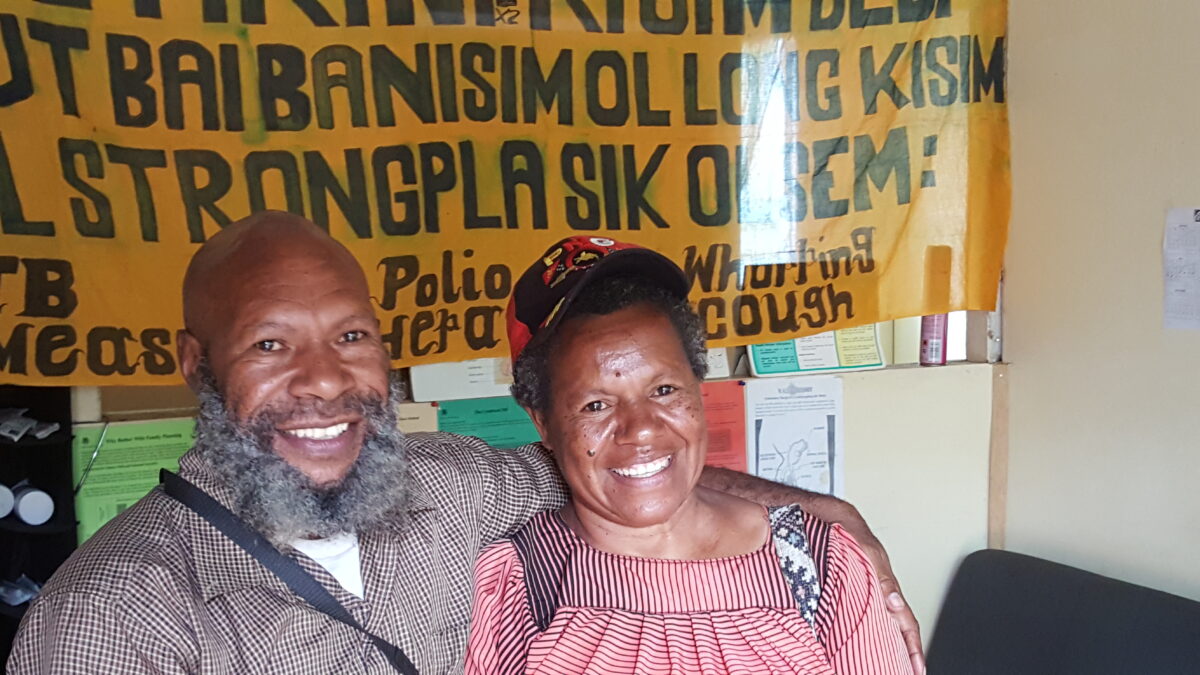Husband and wife Tasman and Annie are helping make childbirth safer for women in Papua New Guinea. The health clinic they run together, Barola Haus Mama’s, is combatting the dangerous risks for mothers and babies in the region, where one in 25 women die during pregnancy and childbirth.
Barola Haus Mama’s or Mama’s House is the product of a lifelong dream for Tasman, who, as a boy, watched his mother give birth in the dirt and dust on the roadside.
“I decided right then I wanted to do something about it,” said Tasman.
It’s hard to imagine Tasman as a boy; the large grey wedges of hair on each side of his face that fail to meet in the middle give him an otherworldly look. Like a wise, old man in a duffle coat with the collar turned up.
But he remembers his humble beginnings like they were yesterday.
“Back in my mother and father’s time, they had many, many babies. My mother, Tema, had ten. I was the third child.”
Tasman explained that on the night of his own birth, his mother faced many complications – she had to run for three hours through the night just to reach a basic birthing house. But when she arrived there was no one there. “She was knocking on the door when I was born… she used an old razor blade to cut the umbilical cord.”
Watching his mother go through a similar experience when his youngest brother was born was enough for Tasman to dedicate his life to making life easier for mothers and babies.
He took a job at a medical post as a teenager, cleaning large septic tanks. He quickly advanced to cleaning linen and medical equipment, and eventually learned the basics of supporting women attending the health centre. He signed up for community health training to advance his understanding of maternal health, and finally, with the support of CARE, opened his own maternal health clinic in 2007, which he named Barola Haus Mama’s.
It consists of a perfectly clean space for immunisations, four rooms for consulting patients where everything from health to family planning is discussed, a space for ante and post-natal support, a birthing room, and a small curtained off area at the back where Tasman’s family sleeps.
Tasman explains that educating communities is a vital component of his work – particularly in helping them understand the importance of family planning: “Couples no longer want huge families. This is a good thing. Younger people now prefer smaller families. During my parents’ time, they had no idea about intervals between pregnancies. Many people died. But now, there’s progress!”
Women are encouraged to bring their partners to help men take a more active role in family life. Taboos around pregnancy are still very much alive and well in Papua New Guinea, and many men believe they will lose their strength or develop asthma if they attend the birth or even walk next to their pregnant partner.
“When the man sees his partner giving birth and goes through that process with her, that’s when the husband builds the fullest respect for his wife.”
Barola Haus Mama’s celebrates its tenth year in operation this month, but its financial future has become uncertain as cuts to the Australian Aid budget limit the resources available to Tasman. Without a refrigerator, for example, they’re forced to keep their critical vaccines in an esky in the shadiest part of the building.
Tasman says if the clinic can continue into the future it would be a dream come true. “I’m proud of the legacy we are building,” he said, smiling through his beard with his wife Annie smiling beside him. “The only thing I really want is to hear people say ‘Thank you doctor for helping us’.”
Read more about CARE’s work to improve the health of women and children in Papua New Guinea.

